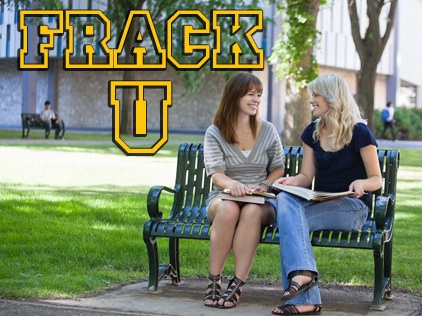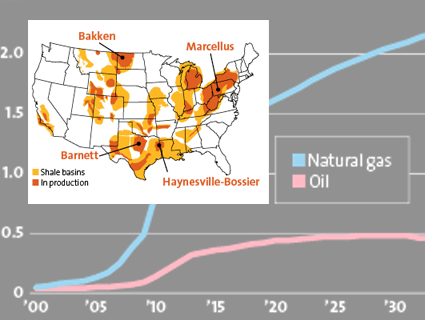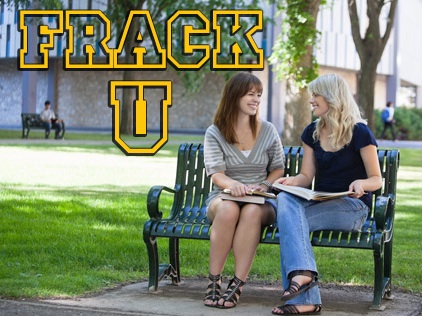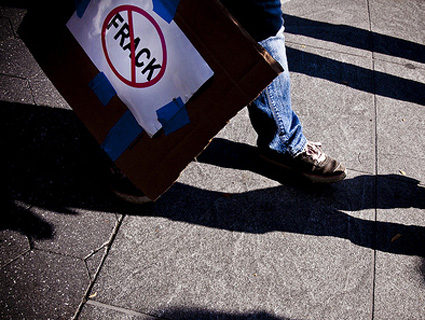
Photo Illustration: <a href="http://practice.motherjones.com/authors/dave-gilson">Dave Gilson</a>; <a href="http://www.shutterstock.com/cat.mhtml?lang=en&search_source=search_form&version=llv1&anyorall=all&safesearch=1&searchterm=college+campus+girls+bench&search_group=&orient=&search_cat=&searchtermx=&photographer_name=&people_gender=&people_age=&people_ethnicity=&people_number=&commercial_ok=&color=&show_color_wheel=1#id=85571599&src=30d981fe624f7591fe605aaa7d20a25d-1-4">Tyler Olson</a>/Shutterstock.
Remember that questionable study put out by the State University at Buffalo earlier this year, the one that claimed Pennsylvania was doing a good job at regulating the fracking industry? This week SUNY Buffalo’s president announced his decision to shutter its publisher, the school’s own Shale Resources and Society Institute (SRSI).
University president Satish Tripathi did not mince words when it came to explaining why. “Conflicts—both actual and perceived—can arise between sources of research funding and expectations of independence when reporting research results,” he wrote in a public letter released to the university community on Monday. “This, in turn, impacted the appearance of independence and integrity of the institute’s research.”
In May, the study released by the university’s newly created institute claimed that the likelihood of natural gas industry violations in the Marcellus region had decreased between 2008 and 2011, a tribute to Pennsylvania’s regulating efforts. In fact, the rate of major environmental accidents increased by 36 percent, as later pointed out by corporate and government watchdog, the Public Accountability Initiative (PAI).
The PAI’s followup was also quick to highlight passages patently lifted from the authors’ previous reports, the study’s failure to disclose the authors’ relationships to the natural gas industry, a fudged peer-review process, and blatant “industry spin.” In the days following the PAI report, Timothy Considine, one of the study authors, told the Washington Times he stood by his interpretation of the numbers, while the university promised to “examine all relevant concerns.” After an investigation requested by the school’s Board of Trustees and a 10,000-plus signature petition led by faculty and students calling for the institute’s closure, it now appears that SUNY Buffalo has taken down the institute’s old online domain for good.
Tripathi’s decision to close the SRSI came in the midst of increased scrutiny over industry-funded academic reports. Last month, the industry-backed Marcellus Shale Coalition canceled its funding of a Penn State hydraulic fracturing study after faculty members declined to take part. The project’s earlier publications had been co-written by former Penn State professor Tim Considine, one of the co-authors of the SUNY report. The University of Texas at Austin has also launched a probe into its controversial research on groundwater contamination—though the chair of that investigation previously served almost two decades as a ConocoPhillips boardmember.
Is this a small victory for academic accountability? Sure, an “institute” did break under the weight of incisive coverage and public criticism. But maybe the SRSI’s brief lifespan had more to do with industry deadlines than anything else. The SRSI met its end a week-and-a-half shy of New York state’s due date for a decision about regulating hydraulic fracturing within its borders—and if the state fails to meet this deadline on November 29, it’ll have to draft a new set of regulations and usher in another round of public comments. Yesterday, Governor Cuomo announced that the deadline is likely to be extended (again), which could push the decision to end the state’s fracking moratorium back several months. That, as Bloomberg points out, could mean it’s already “too late” for New York to snag some of the Marcellus’ fading winnings. In the end, the Shale Institute just might not have been worth the effort. At least they gave it a college try.












